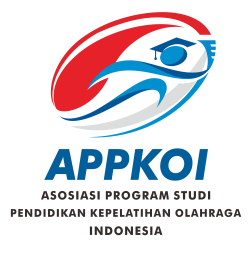Emotional Stability and Self-Control: A Case Study of University Taekwondo Athletes
DOI:
https://doi.org/10.31599/2wewbt27Keywords:
Taekwondo Athletes, Emotional Stability , Self-ControlAbstract
In taekwondo matches, some taekwondo athletes have difficulty managing their emotions and self-control when experiencing unexpected things in the middle of the game, this makes athletes lose focus on their match so athletes have a lack of confidence and damage the match pattern that has been planned before the game starts, such as kicking that does not hit the point repeatedly, and not protecting the body protector properly. This results in athletes experiencing defeat in the match which adds to the emotions of athletes becoming increasingly mixed up and unable to control themselves. Existing studies are still limited in examining the relationship between emotional stability and self-control in university taekwondo athletes. Therefore, this study aims to fill this gap by examining the relationship between the two variables in university taekwondo athletes, The researcher also aims to test the relationship between emotional stability and self-control in university taekwondo athletes. This study uses a descriptive method with a quantitative approach involving 30 taekwondo athletes from the Indonesian Education University. The instruments used in this study are cross-sectional taken from the UWIST Mood Adjective Checklist (UMAC) and Brief Self-Control Scale. After the data has been obtained, data analysis is carried out by correlation testing using SPSS 25. The results of the study showed that there was a significant relationship between the emotional stability and self-control of university taekwondo athletes. This study concludes that emotional stability and self-control play an important role in the self-control of university taekwondo athletes.
Downloads
References
Adelia, E., & Nur Budiono, A. (2024). Kontrol Diri dan Kematangan Emosi Siswa. JKI (Jurnal Konseling Indonesia), 9(2), 77–84. https://doi.org/10.21067/jki.v9i2.10319
Anggraini, D., Khumaerah, N., & Aswar. (2021). Efek Regulasi Emosi terhadap Kecemasan Prapertandingan Atlet UKM Tekwondo di Kota Makassar. Psyche 165 Journal, 14(4), 336–341. https://doi.org/10.35134/jpsy165.v14i4.134
Bayani, S. N., Komarudin, K., Saputra, M. Y., & Novian, G. (2024). Meningkatkan Percaya Diri Atlet Intelektual Rendah Pada Cabang Olahraga Open-Skill Melalui Latihan Kognisi. Jambura Journal of Sports Coaching, 6(2), 84–97. https://doi.org/10.37311/jjsc.v6i2.24739
Budianto, A. K., & Jannah, M. (2020). Peran Self Control Sebagai Pembentuk Strength Atlet Karate Juara Dunia. Prosiding Seminar Nasional Dan Call Paper “Psikologi Positif Menuju Mental Wellness,” 356–368. http://conference.um.ac.id/index.php/psi/article/view/54
Cahyani, N. T., & Siswati, S. (2020). Hubungan Antara Kecerdasan Emosional Dengan Kontrol Diri Pada Remaja Pria Atlet Sepak Bola Di Kota Pati. Jurnal EMPATI, 9(5), 423–430. https://doi.org/10.14710/empati.2020.29267
Dirgantara, R. J. (2020). Pengaruh Stabilitas Emosi dan Motivasi Berprestasi Terhadap Kebanggaan Diri Atlet Muaythai Kota Balikpapan. Psikoborneo: Jurnal Ilmiah Psikologi, 8(4), 757. https://doi.org/10.30872/psikoborneo.v8i4.5580
Drach, R. D. (2021). Pengaturan Emosi dan Fungsi Eksekutif: Perbandingan antara Atlet Taekwondo Perguruan Tinggi, Atlet Lain, dan Non-Atlet. Scholars Archive, the University at Albany’s institutional repository, 1–115.
Fadhilah, M. E., Hasbullah, H., & Fahrudin, F. (2023). Pelatihan Mental untuk Atlet Taekwondo Kota Bekasi. Jurnal Pengabdian Olahraga Singaperbangsa, 3(03), 18–22. https://doi.org/10.35706/moroones.v3i03.9752
Fajri, A. (2017). Kontribusi Stabilitas Emosi Terhadap Kemampuan Pembuatan Keputusan Karier Siswa SMP. Indonesian Journal of Educational Counseling, 1(2), 179–196. https://doi.org/10.30653/001.201712.13
Febrianty, M. F., Purnamasari, I., & Novian, G. (2021). Analisis Aspek Psikologis Atlet Taekwondo pada Tahap Latihan. Jurnal Pendidikan Jasmani, Olahraga, Kesehatan dan Rekreasi, 10(3), 113–120.
Fitri, T. A., Putri, T. H., & Yulanda, N. A. (2021). Hubungan Kontrol Diri Terhadap Kecanduan Game Online Pada Remaja. Tanjungpura Journal of Nursing Practice and Education, 3(2), 40–50.
Hussain, J. A., & Salamuddin, N. (2019). Kebolehgunaan Modul Latihan Mental Imageri Terhadap Atlet Seni Bela Diri Taekwondo. Proceeding: International Conference on Humanities, Education and Society, 266–276.
Irawan, S. I. (2021). Profil Tingkat Kecemasan Atlet Pencak Silat. Satya Widya, 36(1), 1–8. https://doi.org/10.24246/j.sw.2020.v36.i1.p1-8
Li, B., Ding, C., Fan, F., Shi, H., Guo, L., & Yang, F. (2020). Associations Between Psychological Profiles and Performance Success Among Professional Taekwondo Athletes in China: A Multidimensional Scaling Profile Analysis. Frontiers in Psychology, 11(May), 1–10. https://doi.org/10.3389/fpsyg.2020.00822
Loveyama, S. A., & Widodo, A. (2020). Tingkat Kecemasan Atlet Taekwondo Kabupaten Lumajang Dalam Mengikuti Kejuaraan Provinsi Tahun 2019. Jurnal Kesehatan Olahraga, 8(4), 99–106.
Maharani, N. P. S. S. A., & Nurcahyo, F. A. (2024). Regulasi Emosi Pada Atlet: Sebuah Studi Literatur. Bajra : Jurnal Keolahragaan, 3(2), 46–58.
Manapat, P. D., Edwards, M. C., MacKinnon, D. P., Poldrack, R. A., & Marsch, L. A. (2021). A Psychometric Analysis of the Brief Self-Control Scale Patrick. Assessment., 28(2), 395–412. https://doi.org/10.1177/1073191119890021
Matthews, G., Jones, D. M., & Chamberlain, A. G. (1990). Refining The Measurement Of Mood: The Uwist Mood Adjective Checklist. British Journal of Psychology, 81(1), 17–42. https://doi.org/10.1111/j.2044-8295.1990.tb02343.x
Maulana, M. Y. A. (2016). Hubungan antara kestabilan emosi dengan kontrol diri pada atlet beladiri kota surakarta. In Universitas Muhammadiyah Surakarta.
Nugroho, A., Irianto, D. P., Lismadiana, L., & Arga, M. W. (2024). Manajemen Stres Atlet Puslatda Diy Ditinjau Dari Jenis Kelamin, Olahraga Individu, Dan Olahraga Tim. Jambura Health and Sport Journal, 6(2), 165–175. https://doi.org/10.37311/jhsj.v6i2.26891
Paulana, A. N., Rejeki, A., & Sholichah, I. F. (2021). Regulasi Emosi terhadap Resiliensi Atlet Pencak Silat. Psikodinamika : Jurnal Literasi Psikologi, 1(2), 76–83.
Purnamasari, I., & Novian, G. (2021). Tingkat Kepercayaan Diri dan Kecemasan Atlet PPLP Jawa Barat selama Menjalani Training From Home (TFH) pada Masa Adaptasi Kebiasaan Baru (AKB). Jurnal Patriot, 3(2), 203–213. https://doi.org/10.24036/patriot.v3i2.784
Putra, E. P., & Sugabio, I. (2019). Analisis Cedera Atlet Taekwondo Puslatda Jawa Timur. Jurnal Prestasi Olahraga, 1(2), 1–11.
Putra, J. R. H., Aqobah, Q. J., & Triprayoga, R. (2023). Stabilitas Emosi Atlet Futsal Smpn 4 Kota Serang Pada Saat Pertandingan. Sport Science and Education Journal, 4(2), 42–51.
Rizki, Y. M., Sumartono, A., & Kurniawan, A. (2021). Hubungan Antara Psikologi Olahraga Dan Psikologi Pelatih Dengan Prestasi Yang Dicapai Oleh Atlet. Journal of Nursing Research, 1(1), 32–39.
Rozali, Y. A., & Sakti, G. F. (2015). Hubungan dukungan sosial dengan kepercayaan diri pada atlet cabang olah raga taekwondo dalam berprestasi (Studi pada atlet taekwondo club BJTC, Kabupaten Tangerang). Jurnal Psikologi, 13(01), 26–33.
Sabatini, N. K. G., Nugraha, M. H. S., & Dewi, A. A. N. T. N. (2019). Faktor-Faktor Yang Mempengaruhi Kecepatan, Kekuatan, Dan Daya Ledak Terhadap Tendangan Pada Atlet Taekwondo. Jurnal Pendidikan Olahraga, 8(2), 85–89. https://doi.org/10.31571/jpo.v8i2.1120
Salfina, Y. F., & Aulia, P. (2021). Pengaruh Latihan Mental terhadap Penurunan Kecemasan Bertanding pada Atlet Taekwondo Kodim Bukittinggi. Jurnal Pendidikan Tambusai, 5(1), 289–295. https://jptam.org/index.php/jptam/article/view/946
Simandjuntak, C. N., Hanum, D., & Saputri, N. (2024). Peran Psikologi Olahraga dalam Meningkatkan Kinerja Atlet Bulutangkis. 14(5), 330–337.
Singh, A., & Sathe, A. (2018). Effect of a 6-Week agility training program on spatiotemporal parameters in gait cycle of Indian taekwondo players. Indian Journal of Physiotherapy and Occupational Therapy - An International Journal, 12(4), 6. https://doi.org/10.5958/0973-5674.2018.00071.0
Wolff, W., Bieleke, M., Martarelli, C. S., & Danckert, J. (2021). A Primer on the Role of Boredom in Self-Controlled Sports and Exercise Behavior. Frontiers in Psychology, 12, 1–8. https://doi.org/10.3389/fpsyg.2021.637839
Yusuf, M. S. (2024). Pengaruh Emosi terhadap Performa Atlet dalam Psikologi Olahraga. Journal of Sport Coaching and Physical Education, 9(2), 162–169.
Downloads
Published
Issue
Section
License
Copyright (c) 2025 Raisya Nurkhalida Ramadhani, Komarudin Komarudin , Mochamad Yamin Saputra, Geraldi Novian

This work is licensed under a Creative Commons Attribution 4.0 International License.






.png)







